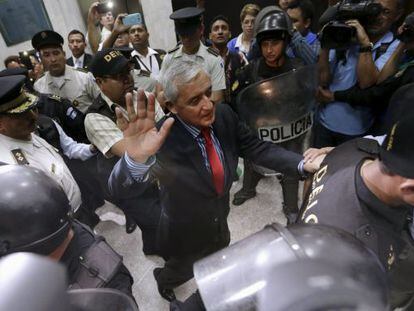Comedian wins first round in Guatemala’s presidential elections
Wave of popular indignation gives victory to Jimmy Morales and his anti-politics message


A 46-year-old Guatemalan comedian has taken the lead in the first round of the country’s presidential election with 25 percent of the vote. As Guatemala grapples with the effects of the civil unrest that led to the imprisonment of former President Otto Pérez Molina, Jimmy Morales, armed with an anti-politics message, has taken advantage of this desire for change and an extraordinary voter turnout: 80 percent of the population cast their ballot in Sunday’s election.
On October 25, the unclassifiable and explosive Morales will likely compete against former first lady Sandra Torres, who finished just a fraction ahead of millionaire Manuel Baldizón – just 3,000 votes with 97 percent of votes counted. These antagonistic forces have one thing in common: both stand far removed from those figures whom the Guatemalan people associate with a system that has filled them with indignation.
Despite Morales’s criticism of the establishment, his motives remain unclear
Torres is a refined example of old politics. A woman with big ambitions, she was catapulted to the political front line after her husband Álvaro Colom was elected president in 2008. She tried to present herself as a candidate to succeed him in 2012 and, in an attempt to get around constitutional restrictions on family members of former presidents running, filed for a quick divorce. However, the plan was contested by the courts and so she had to wait another four years.
Known as “Doctor Copy and Paste” since it was revealed that he plagiarized a large part of his doctoral thesis, Baldizón is the owner of a vast fortune of unknown origin and the man everyone thought would win before civil unrest broke out. During his long journey to power – he ran in 2011 – he has founded a party, Renewed Democratic Liberty, that has adjusted itself with strict discipline to the requirements of the Guatemalan system, a world of political organizations without clear ideologies in which parties only serve as vehicles to bring their leaders to power. Baldizón’s running mate is the controversial Edgar Barquín, ex-director of the country’s central bank. The International Commission Against Impunity in Guatemala and the Attorney General’s Office have accused Barquín of taking part in a money-laundering ring.
Known for his TV show Moralejas, Morales has been the surprise of this election, rising in the polls and then winning in the first round. The winds of change are blowing in his favor and Guatemalans support his anti-politics message and the fact that he is an outsider.
But despite his criticism of the establishment, his motives remain unclear. For example, he has the support of some of the toughest sectors within the military. Whether he remains in the lead in the second round depends on whether he can stand up against Torres or Baldizón, the only candidates with enough money to keep campaigning for the next two months.
Meanwhile, Guatemala faces an uncertain future. The so-called Revolution of Dignity has lost its main catalyst. With the country’s former president, General Otto Pérez Molina, and former Vice President, Roxana Baldetti, now behind bars, the people’s indignation may run out. And although activists hope to use its momentum to promote a political renaissance, experts say the eclectic group that cuts across demographics to join forces to push for change may now break up into different movements, each one too weak to bend a political class long used to its way of doing business. Until the official transition of power on January 14, 2016, an interim president, whose main achievement has been overseeing the smooth process to bring the former president and his vice president to justice, will lead the country.
Neither have these presidential elections offered any clear answers. The political class trails behind the country. None of the 14 presidential candidates in the race has been able to establish themselves as the country’s leader and harness the energies of that great citizen movement that toppled Pérez Molina. After the last few triumphant days, a cloud of frustration has settled over the nation. Few believe any of these presidential hopefuls can create the kind of change the country requires. Guatemalans are losing confidence. Demonstrations held over the last few months showed the power of popular will and many say they will take to the streets to protest if the country takes the smallest step backward. But the essence of this dynamic, spontaneous movement may be its downfall: it has no leader and, if it loses momentum, the country will certainly fall backwards.
None of the 14 candidates has been able to harness the energies of the movement that toppled Pérez Molina
According to the United Nations, 50 percent of contributions made to Guatemalan political parties come from organized crime, including drug gangs, and corruption is embedded in the country’s highest authorities.
After years of bloodshed and fire, Guatemala is still in danger.
English version by Dyane Jean François.











































